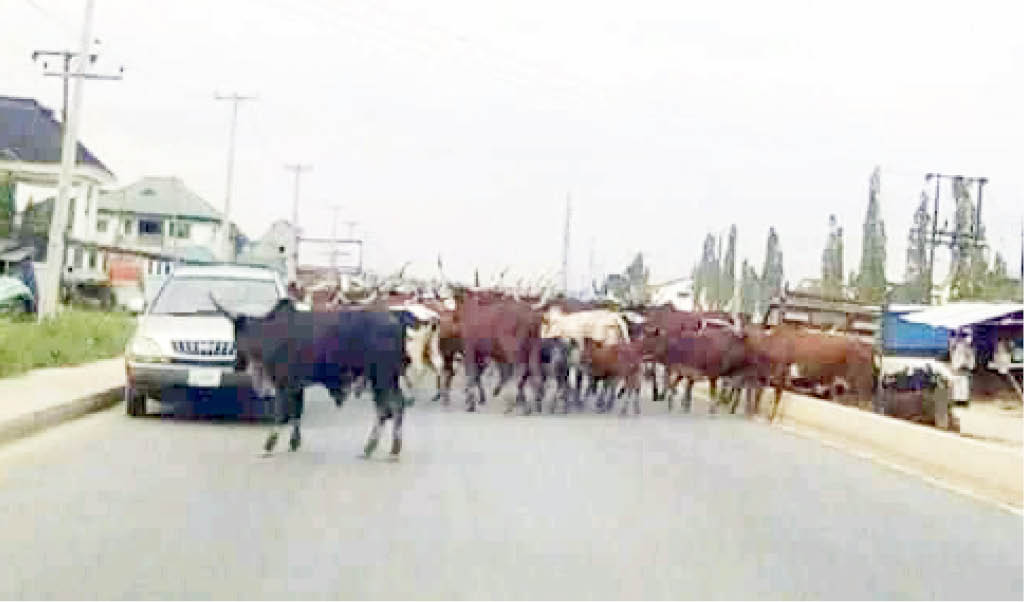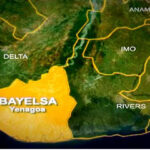Grazing or anti-open grazing laws are becoming fairly common in the country in view of increasing hostilities between herders and farmers. A recent addition is the one from Bayelsa and our correspondent reports on what this law means.
Sometime in February, Bayelsa farmers, Kohgi Samuel Nation, 18, and his aged father were attacked in their native Otueke Community in Ogbia Local Government Area of Bayelsa State.
Their assailant was thought to be a Fulani herdsman who ambushed them in the Osuan bush and injured the locals. The cause of the attack was said to be a missing cow belonging to the herdsman.
As such incidents tend to do, this one too generated tensions with some youths in the community threatening retaliation on behalf of the injured farmers. The intervention of security agencies ensured the situation did not escalate.
Police authorities in the state appealed to members of the public to remain calm as the command is working assiduously to identify the suspected herder and apprehend him.
That was not the only such incident as in that same month, some aggrieved women from Epie/Atissa communities in Yenagoa, the State capital, staged a peaceful protest against what they described as the excesses of herdsmen in the area.
The protesters demanded the herdsmen to leave their farmlands.

The situation was no different in Okutikutu-Epie community, as farmers, most especially women, were outraged over the destruction of their crops by suspected herdsmen and their cattle.
To check the clashes between farmers and herders, Governor Douye Diri signed a law against open grazing.
Granting executive assent to the bill tagged, “Livestock Breeding, Rearing and Marketing Regulation Law 2021,” the governor said the law is to ensure harmonious living between cattle breeders and other inhabitants of the state.
Disturbed by the clashes between farmers and herders and its attendant security threats to the state, the state assembly breezed through enacting a law to ban open grazing complemented by the state government providing space at Bayelsa Palm Road as a grazing facility.
Debating on a motion raised by the leader of the House of Assembly, Hon. Monday Obolo, the assembly said the bill is a sequel to the unpleasant experiences in the state.
“It is indispensable to pass an appropriate law for the safety and security of all Bayelsans and other Nigerians living in the state,” he said.
While explaining the necessity of the bill, Obolo said that when the bill is passed into law, it would necessitate the creation of a regulatory committee that shall be saddled with the responsibilities of ensuring that all aspects of the law are put in proper perspectives.
He emphasized that all livestock presently in the state, and others that may wish to come into the state must be duly registered with the appropriate authorities, and the governor must approve licenses given.
Also speaking in support of the bill, Hon. Bernard Kenibai, Salo Adikumo and Emmanuel Isenah described it as apt and a step in the right direction, because when passed into law, it would curb the excesses of the herders and the incessant clashes arising from them.
They explained that the law would ensure peaceful co-existence between the herders and Bayelsans, especially with respect to the ugly incidences that occurred in Kaiama, Sampou and Agbere in recent times.
Other members who spoke before the bill was passed noted that private businesses should not be allowed to interfere with the peace and security of others, as such things negate the fundamental human rights of as enshrined in the 1999 constitution.
Governor Diri, while assenting to the bill, said the essence of the law is to ensure harmonious living between cattle dealers and other inhabitants of the state and to forestall the violent clashes being experienced in other parts of the country.
He said, “Bayelsa State welcomes all and sundry who want to eke out a living legitimately. The people of Bayelsa want to have a mutual and harmonious relationship with non-natives and natives. The essence of the law is to avert and forestall any clash between herdsmen, farmers, natives and non-natives as experienced in some states.
“This law stipulates that any herdsman found with arms, whether licenced or not, should be arrested.
“From the commencement of the law, no person shall breed, rear or trade-in livestock in any part of the state except in other places as may be designated and approved by the state government.
“This law prohibits movement of cattle on foot from other parts of the country into the state, inspection of livestock and certification by veterinary doctors at entry points into the state among other things.
Already, Governor Douye Diri, has constituted a 23-member committee to implement the Livestock Breeding, Rearing and Marketing Regulation Law.
The committee, chaired by the Commissioner for Agriculture, Mr David Alagoa with the Special Adviser 1 on Security, Akpoebi Agberebi, Director of Livestock in the Ministry of Agriculture, Dr Emara Ibegu, and representatives of the police, DSS and NSCDC as members.
Other members of the committee include; King Mozi Agara (Kolokuma/Opokuma Local Government Area), King Dumaro Owaba (Ogbia), Clever Inodu (Nembe), Ebiks Lokpobiri (Ekeremor) and representatives of the four other councils in the state, among others.
The governor in a statement by his Chief Press Secretary, Mr Daniel Alabrah, quoted him as saying while inaugurating the committee that the law took effect from the day it was signed but the power to execute it was vested in the committee.
Consequently, the state implementation committee has given herders until April 10, 2021, to move their animals from farmlands and bushes across the state and relocate to the Bayelsa Palm in Yenagoa that is designated for cattle rearing or risk impoundment.
The ultimatum was given recently after a meeting between the livestock management committee and the leadership of the Miyetti Allah Cattle Breeders Association of Nigeria in charge of the South-South zone in Yenagoa.
The Chairman of the Committee and Commissioner for Agriculture and Natural Resources in Bayelsa State, Hon. David Alagoa, described the deliberation as fruitful, saying that the ultimatum, which expires on April 10, was given after due consideration, taking into cognizance the technicalities involved in the cattle business.
He said, “We have agreed that we will give them 14 days, which ends on 10 April 2021. We will start impounding any cattle found outside designated areas.
“The governor has opened business opportunities for everybody who wants to go into the livestock business.
“If you have land now and you want to ranch, you can do so. We are going fully into ranching, if you want to plant grasses and sell to cattle breeders, you can do so.”
The leader of the Miyetti Allah Cattle Breeders Association of Nigeria, Mohammed Tukur Abubakar, expressed their willingness to move their cattle to the designated place given to them by the state government.

 Join Daily Trust WhatsApp Community For Quick Access To News and Happenings Around You.
Join Daily Trust WhatsApp Community For Quick Access To News and Happenings Around You.


